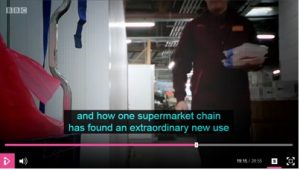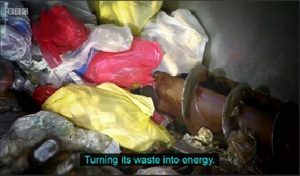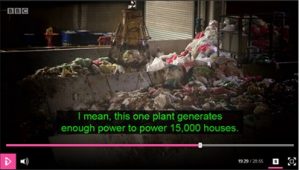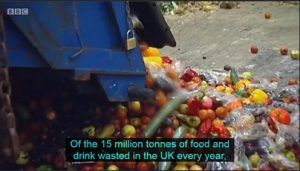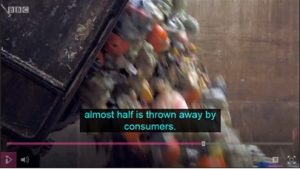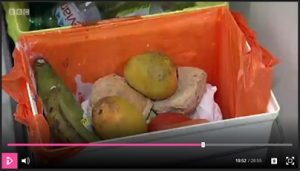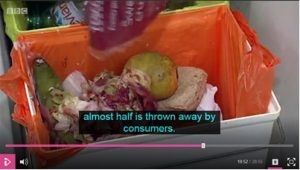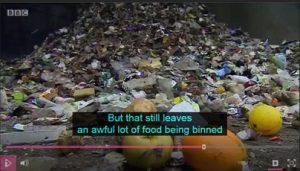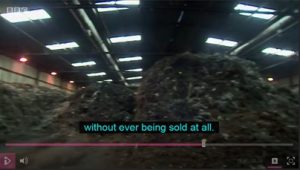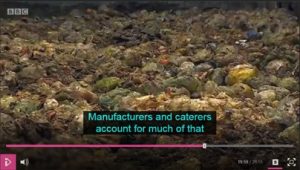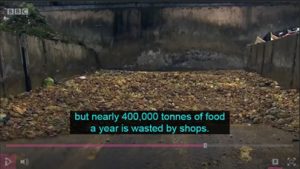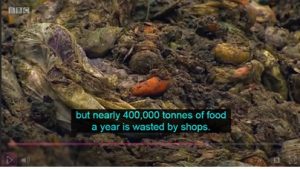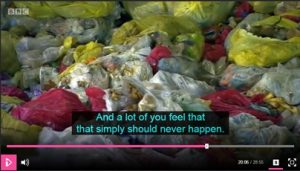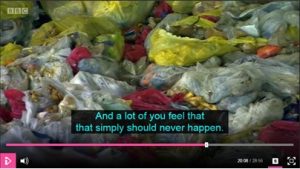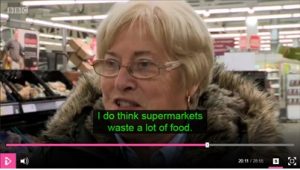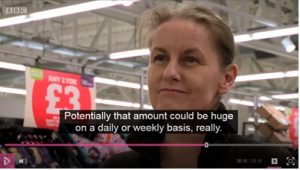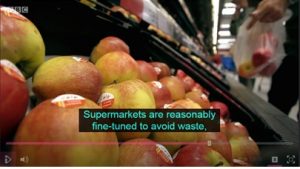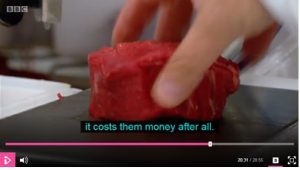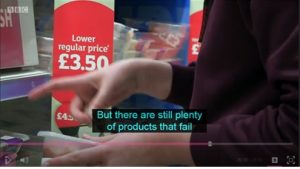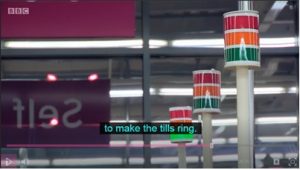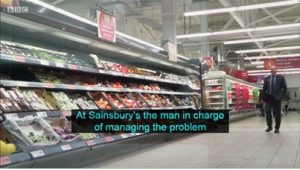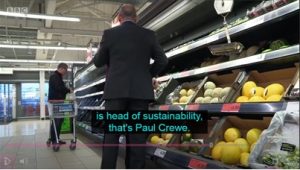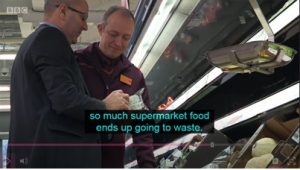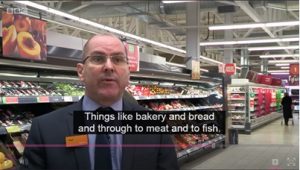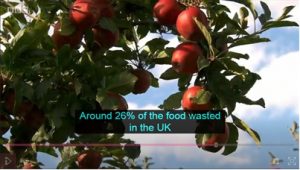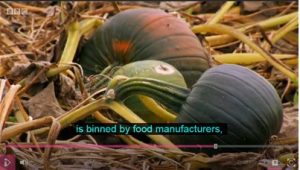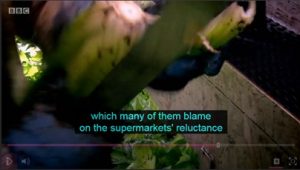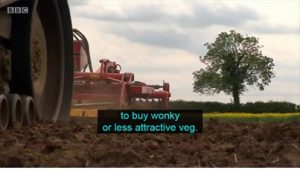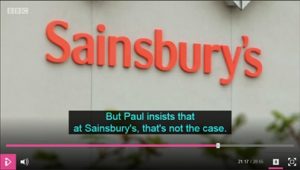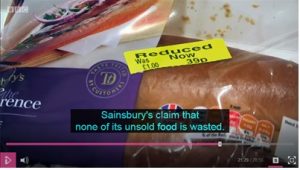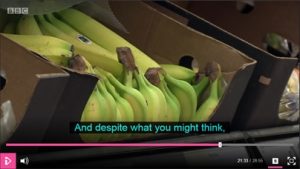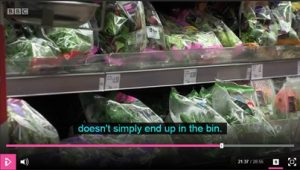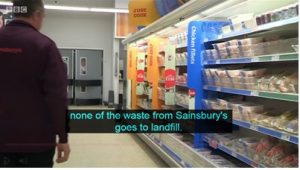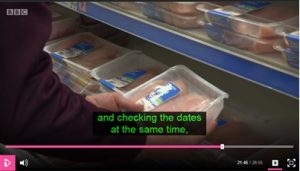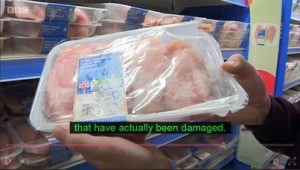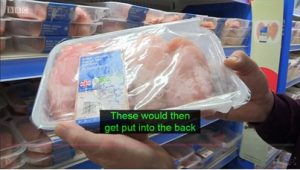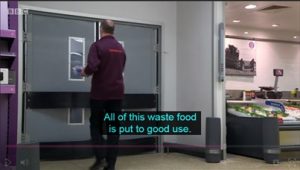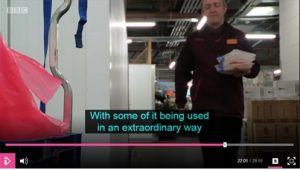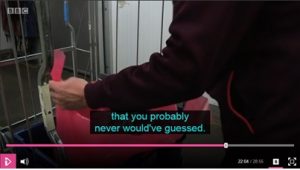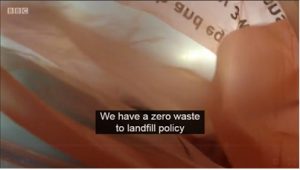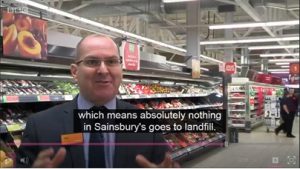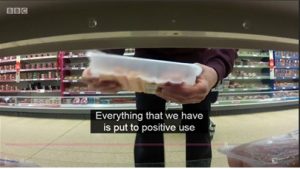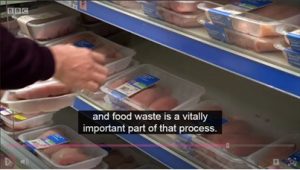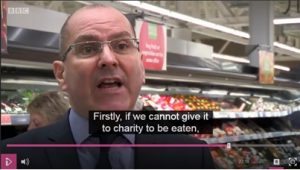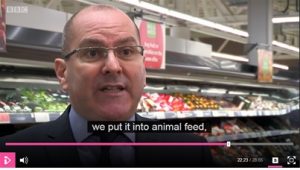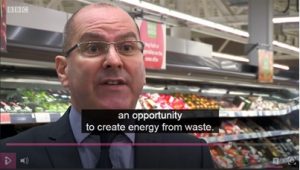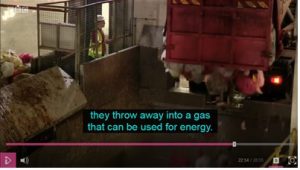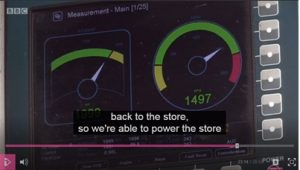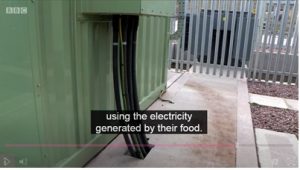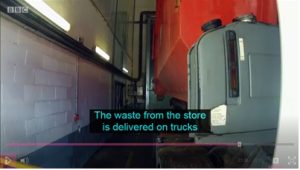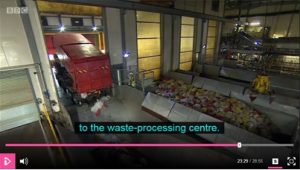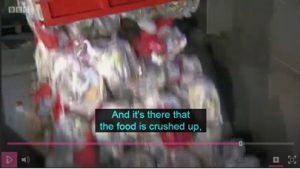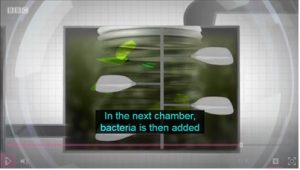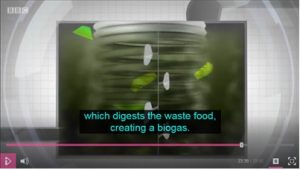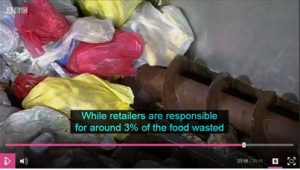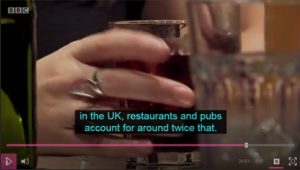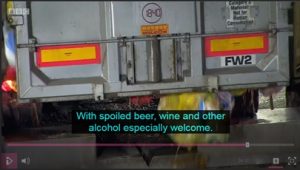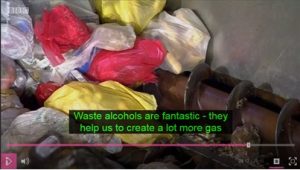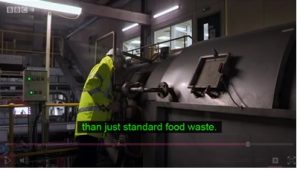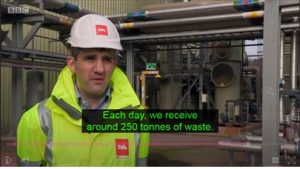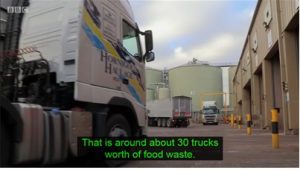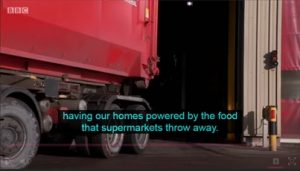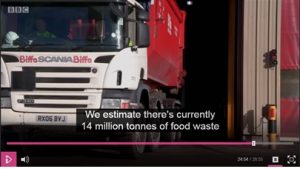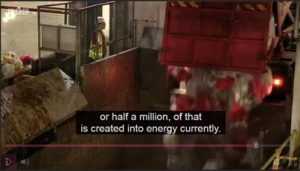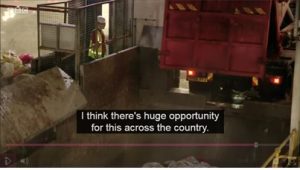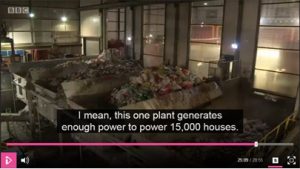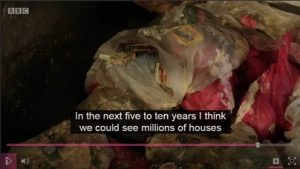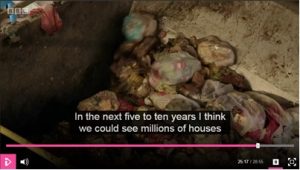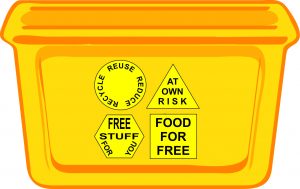I love my dog, Trixie, she has taught me a lot about food waste, seriously, she was a street dog once and was rescued and now she lives with me and has provided me with valuable lessons, and is a great compass, particularly when we’re or more accurately I’m lost in woods. She has steered me too to see the human folly of throwing away perfectly good food to eat. This all started on Saturday and Sunday morning walks – very early by the way, the early bird catches the worm and the early dog catches the chicken and chips! – when before Church I thought a nice placid stroll would put me in a prayerful frame of mind before Mass; Trixie, however, had other ideas, she was not going to miss a trick, an opportunity not to be missed, we were guided by her to the takeaway venues and just outside the streets were paved with chicken and chips, which she lapped up and I bagged up – to make it quicker, a more efficient speedier walk – the bags I took along with us started small – the little poop bags – then I got it down to a fine art, with at least a couple in one bag to carry (didn’t want to tempt fate that there might be nothing there and look a little bit silly) After quite a number of weeks I occasionally found stuff that I could actually eat and share with Trixie, and then I started to do as Trixie did and looked in bins too, as it appeared to be a fruitful activity. It still is, although one fantastic source of food has dried up, the supply has completely frozen off, that of the Biffa bin just outside Iceland in the centre of town.
I was just enjoying freeganning – freeganning is where you look into supermarket skips and get free food, food that has been thrown away, about to be disposed of and completely wasted – taking home loads of lovely food and sharing it too, more than once with our local Food Bank collection at church. There was really such a thing as a Free lunch! – and a free supper and breakfast too! It was great. I felt a sense of economic security too, I could live off very little – The Good Lord provided as they say and he did!
This gradually came to an end when so-called do-gooders campaigned to give all unsold food to charities – but with caveats, the small print I read said it had to be fit for human consumption – I had seen big purple bags of bread in Tesco with unfit for human consumption all over them, about 5 of them full of their in store bakery bread – so I knew what that meant in reality, also that legally they can’t sell food past it’s sell by date, and from personal experience in Sainsbury’s when I saw some lovely fish that was past it’s sell by date, when I said could you just give it to me, they said no they could not – so I know that this giving it to charity is just a social media public relations exercise in reality – thinking Tesco on facebook, I was cynical at the time as they were reducing the number of Everyday Value items, including Cocoa powder I used for baking that was higher in protein and lower in fat than the regular cocoa which was double the price of the economy brand [this was to subsidize home deliveries, which do not pay for themselves, they are a cost to the companies and lose the buzz of a store full of people who also make impulse buys, another loss] The poor subsidize the rich here, and it looks like from the video stills they have joined the Biffa scheme.
Another aspect was that my main focus for freeganning, Iceland in town, was also beneficial to the local homeless, and one man came from London posing as that, so he could sell drugs and get a gang into my home town of Swindon (one benefit of my walking there, with my dog, was that I got to know this, I informed the Police, and the gang could not establish itself) The trouble was this particular man left lots of mess, as opposed to the genuinely homeless guys, so Iceland were asked by the Police to dispose of their waste differently, one skip bin went (probably for an indoor location) and the other now has a padlock on it. The messed up drug man has since died, to my relief as I was fearful. I sadly know that now it will all be disposed of, not eaten by anyone, what a waste. My dog also benefitted well with food that I could not safely eat.
I do have an idea of what to do about this – I do know about recycling, years ago, in 1997, though I had had the idea a lot earlier, I suggested on my political website, www.orionparty.org that admittedly does have some silly stuff on it – but then again do you know a single entirely sensible politician!? – Rainbow Recycling. This is now how it is done, and although I never got paid for the idea, it has saved local Councils and Businesses loads of money, it just shows that ideas do have a financial worth and that those who cannot get by from them will have their talents and skills wasted as this isn’t a worthwhile job without pay.
What I’d do is have Bright Yellow Boxes with sticker notices on them so people are aware they are free to take stuff but that it is entirely their decision, no receipt, no guarantee, no comeback – that’s what the clear messages are all about. These could vary in size from and to:
Standard Recycling Boxes
Half-Height – for those wishing to feed wildlife, after all they would be foraging in the fields and forests if we had not built all over them, and to not say to Everywhere to look after their huge wild beasts to their detriment and yet not tolerating even the smallest in your own back yard – an hypocrisy that is not lost on me.
Half-Width – for street side properties so people can pass on the pavement
Table – for stores – they can put “AT OWN RISK” warning triangle stickers all over the stuff they give away, particularly over logos and barcodes. This design would be like sand and water play tables, sunken boxes in effect, not too deep for display purposes – rules for quantities per person could be itemized. Appropriate charities could be informed on the internet before items go out – what I mean by appropriate is that charities that serve the poor are appropriate, those with different aims are not, they would be like the rich stealing from the poor, a cynical cheesy “It’s for charity” which grates more than cheese can ever do.
All these examples would be covered by a single hinge clear cover which overlaps the other side – this is so you can simply see what is inside (unlike black wheely bins which I think discourage recycling as you can hide all sins in these) and the loose overlap hinge makes it easy for anyone to open. In high wind a weight like a brick could be placed on top – these days are rare in the UK. Having one permanent hinge which cannot come off will keep it there, and can go right over, so you can have both hands free for freeganning, one for lifting the goods, one for holding and keeping open the bag they are to go in.
We all have recycling boxes at home – this could be just another one, you would put food in that you think is not fit to eat (I once keenly spotted something that its best before end date was tomorrow! – people have different sensitivities) and let it stay in there for a week at least, and then when you think it is about to smell or leak put it into your main rubbish knowing that you did at least try your best and there were no takers this time. Keep persevering as it takes a while for people to find your treasures. Another approach is to unite with others – particularly useful for those in long and winding streets, with houses wide apart, is to get a larger version if need be, and decide to site your treasure chest at the start of the road, so it is easy for people to reach, and on both sides no-one feels watched or judged – your neighbour might fancy what you put out but doesn’t want you to know that!
The trouble with giving the food to charities is that they serve vulnerable people with less strong constitutions, so some of this might make them ill, but for a people of a more robust age would be perfectly alright with, so you give it to a charity, they say Thank you, and then invisibly throw that food away worried about being sued for food poisoning.
You can put all sorts in these boxes, if you’ve got a fruit tree, as I have or know of one to forage, you can fill your box until it is full with it. If you’ve got a garden of an allotment and are over-whelmed with produce you can share it out to willing help yourself-ers who will be more than happy for such superb stuff to eat. (it would be lovely to have an easy way of sharing) After a party and you’re all stuffed – there you go and another can have one too 🙂
When seeing what people threw away – when recently the recycling and rubbish day was split into 2 days for efficiency – which shows that delays for throwing away can be done – I also saw not only perfectly good food, of nearly can be made good standard, but also perfectly good things that weren’t food too.
I also found perfectly good stuff in charity shop skips – just so you know where to go! – sometimes there are reasons why they don’t sell or they don’t think they’ll sell – sometimes it’s patience and space with all the donations they receive, really it would be better to sell some stuff on ebay, even a local ebay, so there is definitely no postage, they can be picked up. Or you could put this FREE STUFF in these boxes for other people to pick up for their own personal pleasure or for people who would love to sell them on ebay as a business to generate income from what you regard as rubbish – it is amazing what is on offer online, stuff years ago you thought if you didn’t buy it immediately you’d never get one, ever. And the smallest most seemingly insignificant items are the ones you seek for like a needle in a haystack – and they can now be found, mostly, you could help other people’s quests for what they have been looking for, for ages. And likewise with the food, though leaving things a little longer as these don’t go off, give it a bit of time for people to pick things up and then when you have, feel perfectly justified to bung them in the bin.
There have been programs which are really brilliant about food waste, which they have found success in preventing it, particularly farmed food that didn’t meet certain cosmetic standards.
http://www.jamieoliver.com/news-and-features/features/reclaiming-wonky-veg/
and
https://www.lovefoodhatewaste.com/content/8-top-tips-love-food-hate-waste
Jamie Oliver: “In our new Channel 4 series, Jimmy and I are hitting the road to fight against one of the biggest food crimes of our time – food waste. When half a million people in the UK are relying on food banks, this waste isn’t just bonkers, it’s bordering on criminal.”
I am aware, via e-mails of gleaning activities, to harvest crops that were no longer wanted to sell, to be given to the needy – the ones I have heard about are a bit far from my home, but they do make me think. There needs to be a system where those with lorries come and gather them and put the produce in store Tables or Pools – which would be the same without legs, so offloading is easier – so it can all be eaten before it goes off. They could drop it off at a number of fairly near locations to the farm and others could pick up large amounts to deposit further afield – so the bounty is spread out far and wide without exorbitant shipping costs to the producer (any costs they do incur getting the lorry should make them exempt from tax for these plus a bonus for distribution costs) It is bad not eating food generated as if that food had not be grown there other animals could have had that land to live on and live off, which is criminal, a theft from them. It would be perfectly reasonable to give tax incentives and gifts to all professional organisations participating in this, as the real reason they throw things out rather than giving them away is the loss to the profit margin, their survival – so to stop this battle we should give in by giving them what it’s worth to them, so it is a win win all round.
It’s also a foodbank everywhere – no pleading – no form filling – no ritual humiliation – it is meant to be a Free country so they say – so why not actually be one!
Feed the Birds – but at less than tuppence a bag! (Mary Poppins movie reference)
You can see from the video stills of this programme Rip-Off Britain – Food… (before this clip they show one of a woman with tinned food and spices in her cupboard that are many years old, that have been tested and deemed fit to eat) First shown: 11:45am 27 Nov 2015 that Biffa the waste firm are using food waste to generate energy – Biffa is the firm Iceland use – I used to get bananas from their skips, they were lovely. People eat bananas at different stages, some like them nearly green and others yellow, and still more black is deemed ripe. You are probably aware of the calorific values of food, and that lettuce and cucumber have particularly low calorific or energy value, other vegetables are also very low rated, so this is a most wasteful, energy inefficient electricity generation – it’s just a way of denying good food at low prices or free to the poor, cruel and criminal. It is not worthwhile to do this, there are far, far better ways, I’d go so far as to say it is a dodgy geezer activity.
Look at the video stills: observe the sheer quantity of plastic, an oil – that probably generates a lot of the electricity alongside the packaging, the dry elements – as the energy value of most foods is low – is what is generating the food waste energy, and to cycle it round to farming fertiliser is pointless, energy cycle wise, if the food generated there is never going to be transferred into food energy because it will never be eaten, what a waste of a potential home for an animal, a habitat for a plant, and the price the consumer has to pay in the shops as it’s ‘illegal to sell the food’ line is (look at the example with the meat – butchers sell meat not in integral plastic packaging – it is invariably open to the air) in reality a professionally lobbied position to parliament (or complete and utter rubbish) to ensure high prices are maintained and we are effectively enslaved to that.
Then there are in every store all across the land now, the very high and impenetrable locked up gates hiding all their sins away.
I asked in Aldi for food that was about to be thrown away, they did not know what to do – I explained about food waste, they reduced the items but not by a lot, not an amount I felt fair when they were going to get nothing for them if I’d not asked. To be fair to those I’ve mentioned, this is a universal issue with all retailers – I need examples of empirical evidence to explain the problem that my solution will solve in a positive way that will be popular.
I saw some perfectly good bread in a Waitrose bin in one town when visiting family, but the Waitrose where I live is a new one so has a gated area for trash. (they do reduce good quality items well overall, provided you get there at the right time – I’ve made lovely lime curd and orange marmalade from their reduced fruit) The new Morrisons also reduces very well, again if you get there at the right time, but their gates are bigger and completely impenetrable.
If they didn’t have anything to hide, why would they do that? It’s not Health & Safety, whatever they say, it’s Security of Wealth for the CEO etc. not in the Interests of the Customers. The company consumes the so-called rubbish and perhaps they think if they’re profiting they need to spin this stuff to make themselves look good, at least superficially. To make it hard for us to argue, fight back and face them up with the truth. That this would rub it in and rub us up the wrong way when we knew, we would know the rubbish they spouted. We would demand a fair share. And anyway, whatever happened to the notion and the reality of living in a Free Country? Wake Up People! Make it happen.
http://www.bbc.co.uk/iplayer/episode/b06qspd9/rip-off-britain-food-series-2-reversions-episode-5
and
http://www.channel4.com/programmes/tricks-of-the-restaurant-trade/on-demand/63971-004
P.S. Before these video stills there is some info from
Tricks of the Restaurant Trade
Series 2 Episode 4
Restaurant food
In the UK every year 200,000 tonnes of Restaurant food waste is thrown away in restaurants, and every bit of food thrown out adds to your bill because food waste costs the restaurant industry a whopping £682 million a year. One brand ahead of the game on waste is the Mexican chain Wahaca, with 24 branches around the country it is one of the few chains with a zero landfill policy. At the beginning we really looked at what customers are really leaving on their plates. Eg salsa 20% was actually used so we had this huge waste of salsa so we started to put salsa bottles out, so people could use them. (so no waste as customers used what they had)
Food waste in restaurants broadly falls in 3 categories:
Firstly you’ve got the waste from food preparation, so stuff like these avocado skins the inedible bits of raw ingredients that have to be binned, that counts for 45%
Then you’ve got spoilage, so for example things like food that’s gone out of date, that accounts for 21%
Then finally, you’ve got the waste from customers plates, and this accounts for 34%
To cut the waste being left behind on plates Wahaca train their waiters to be upfront with their customers with how many portions are enough … and should customers still not finish their meal they are encouraged to take it home.
We’ll box it into these boxes, put it in a bag and then we give them a little note which has some suggestions what they could do with it.

We’re just trialling it out and it’s something that can be a lot of fun for customers.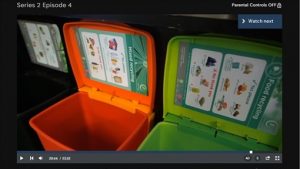
We contacted 20 high street chains to ask them about their waste policies, 9 told us that they were working on initiatives to reduce waste.

McDonalds measure all food waste and along with TGI Fridays have a zero landfill policy, whilst Chiquito, Coast to Coast, Frankie & Bennies and Garfunkel’s use their waste to deliver power to the National Grid, and Nando’s give over 200,000 meals to charity through their no chucking our chickens scheme. 11 major chains out of the 20 we contacted didn’t respond despite numerous prompts from us: Strada, Zizzi Ristaurante, Pizza Express, Eat, Burger King, Prezzo, Café Rouge, Cote Brasserie, Greene King, Burger & Lobster, Toby Carvery.
Of course we don’t have to leave behind our food in restaurants, we can always take it home with us. But how amenable are high street restaurants when it comes to leaving with our leftovers? Adam Pearson is finding out. When they told me to investigate doggy bags they may have got the wrong end of the stick:

To find the other kind of doggy bag I’m visiting a numerous chains for lunch, but will they also offer automatically or will I have to ask? At Garfunkels, Zizzi and Wagamama he asks if that can be put into a doggy bag to take away, he had to ask every time, though they did say yes and he went away with 3 sizable bags from these locations. At Yuatacha, a posh place:

Unbelievable, the most expensive one of the lot and they wouldn’t even let me take home my leftovers. We asked Yuatcha if it would reconsider its doggy bag policy and they declined,
telling us there may be: “some potential risk” In allowing diners to: “take dishes home to re-heat & consume later”
They added that they’re there: “waiters are trained” to advise against: “ordering too much”

Oh well 3 out of 4 ain’t bad, I’ve got myself a feast! To his dog “Come on baby! Let’s go!” Tricks of the Restaurant Trade Series 2 Episode 4
? How much is Sainsbury’s Head of Sustainability being paid – and if they got rid of him could that offset the costs to Sainsbury’s from giving food away for free? That would be extremely sustainable, wouldn’t it, saves wasting wonderful food!
? If Tesco’s can give away free fruit for kids to stop them moaning for unhealthy treats that’ll make them sick why won’t they give away free food – at adult’s own discretion! – that is perfectly fit to eat but their bureaucracy says no to?
Rip-Off Britain – Food Waste – Video Stills:
